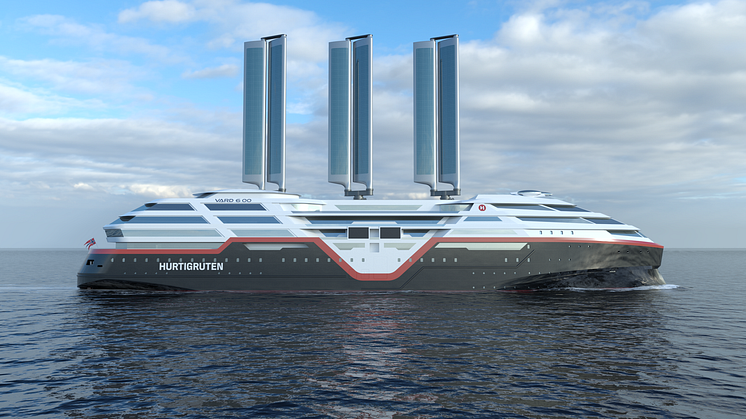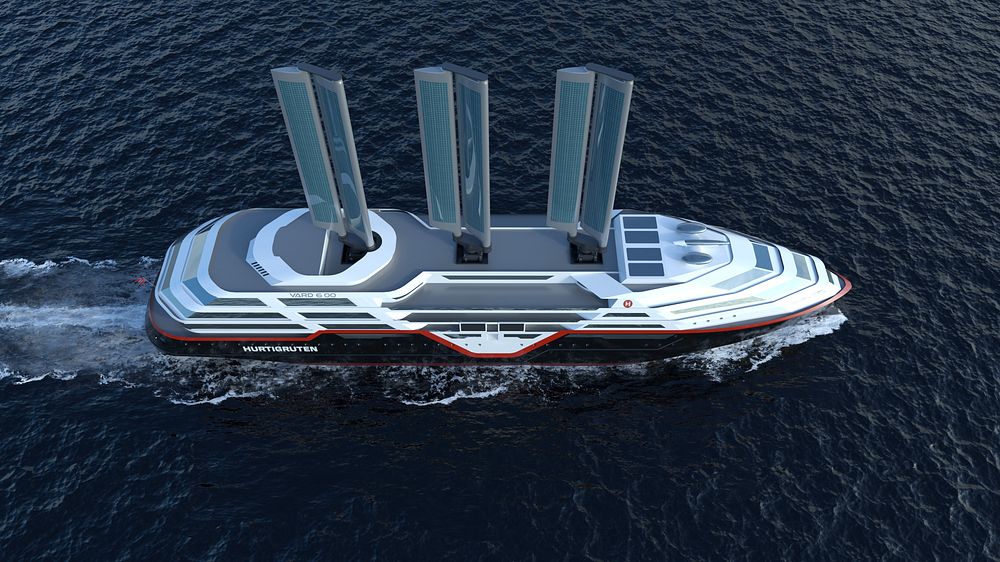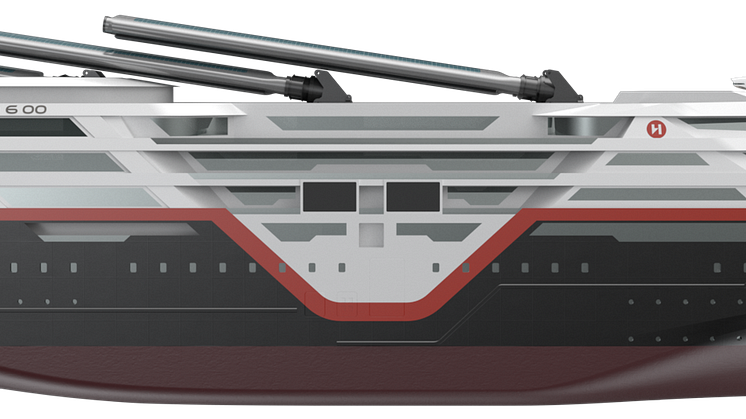
Press release -
Hurtigruten reveals updated plans for its zero-emission cruise ship of the future
New York City (October 11, 2024) – Hurtigruten, one of the leading sustainable brands in travel, has released its updated plans for its Sea Zero project, the zero-emission ship scheduled to debut in 2030, as it is in its research and development phase. With the help of large batteries, sails, and other innovative solutions, the ship will be able to sail entirely emission-free during normal operation, while energy consumption could be reduced by 40-50%.

Rendering by Vard.
Hurtigruten initially announced its Sea Zero project in October 2022, and then unveiled its first set of renderings in summer 2023. As the research and development phase has continued since, a second version of renderings are now released and plans are even more advanced. It was developed in the Norwegian city of Ålesund by Vard, one of Hurtigruten’s key partners in the Sea Zero project, and integrates several innovative solutions created in collaboration with partners from the Norwegian maritime industry.
Sea Zero is one of several industry-leading projects from Hurtigruten that focuses on sustainable travel and industry solutions. Earlier this year, the cruise liner announced its initiative aiming to reduce edible food waste to zero. The company is currently also going through a major 100 million Euro upgrade of its fleet that includes several ships becoming battery-hybrid-powered and state-of-the-art technology that will significantly reduce both CO2 and Nitrogen oxides (NOx) emissions by 25% and 80%, respectively.
“The cruising industry is a significant polluter, and it is crucial that we now take major steps to reduce emissions. Our goal is to have an emission-free ship in operation by around 2030. We are still in the research and development phase, but we have made significant progress,” said Hurtigruten CEO Hedda Felin.
Calculations show that the ship will use about 40-50% less energy than today’s ships, which makes it possible to operate primarily on batteries as the main energy source.
Sails that can be raised and lowered
One of the most exciting elements is the sails, which can be raised and lowered as needed. Preliminary estimates indicate that the sails could reduce energy consumption by around 10% over time. Additionally, solar panels will contribute another 2-3% in energy savings.

Rendering by Vard.
“We still see significant energy savings from having retractable sails with solar panels, but this requires thorough studies, including model tests to be conducted in the coming months. We have also changed the sail type to a more mature design already in use on cargo ships,” said Chief Operating Officer Gerry Larsson-Fedde of Hurtigruten.
The type of sail being investigated is called OceanWings. These French-developed sails are already in use on the cargo ship Canopée.
“As with all development projects, there will be adjustments to both the design and specifications along the way,” Larsson-Fedde added.
Technically advanced
The ship is planned with contra-rotating propellers as the main propulsion, and the batteries will have a capacity of around 60 megawatt-hours. Two retractable thrusters at the stern will ensure optimal maneuvering during port operations and provide increased safety through redundancy.
“The central part of the project is to reduce energy consumption. The goal is to use significantly less energy than today's ships, which requires innovative solutions,” said Larsson-Fedde.
Another measure is air lubrication of the hull, where air bubbles are pumped beneath the hull to reduce drag. This can provide energy savings of 5-10%. Combined with modern hull design, advanced anti-fouling coatings, and regular hull cleaning, water resistance can be significantly reduced. Preliminary results also show that better ventilation and insulation systems, as well as advanced energy management, can lead to significant energy savings.
So-called “smart cabins” will allow guests to control their own energy usage. Guests would be able to control heating and ventilation through an app and a screen in the cabin, while also seeing how much energy is being used. This will increase guests' awareness of sustainability.
“We are already testing advanced sensors in these cabins, and in the near future, we will conduct full-scale tests with guests onboard,” Larsson-Fedde concluded.
Downloadable high-res images of the new Sea Zero renderings can be found in this Dropbox folder.
For more information, please contact:
Anders Lindström
+1.646.944.9029
Anders.Lindstrom@hurtigruten.com
Please visit Hurtigruten Group’s online media center here, where you can download high-res images and videos and access the press release archive.
Topics
About Hurtigruten
The unique Original Coastal Express Voyages have remained the very same for most of the 131 years since Hurtigruten conceived the itinerary up and down the Norwegian coast on July 2, 1893. The route, from Bergen to Kirkenes and back, takes in 34 enchanting coastal communities set amongst world-famous fjords, on idyllic islands and tucked under towering mountains. These itineraries have been the lifeblood of the coastal communities since that first day, making Hurtigruten an authentic Norwegian travel experience.
Hurtigruten’s Signature Voyages are the venerable cruise line’s newest category, a premium experience created to significantly elevate the Norway cruising experience and redefine small-ship sailing.
• The Svalbard Line sails in the summer and lets passengers relive the adventures of the early explorers by traveling up the Norway coastline to the Svalbard archipelago in the Arctic Ocean.
• The North Cape Line in the winter sends you high into the northern landscape to view the magical Northern Lights.




